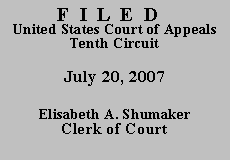

| BRYAN LEE BROYLES, |
|
| v. | |
| DAVID R. McKUNE; ATTORNEY GENERAL OF KANSAS, |
Mr. Broyles then sought relief in the United States District Court for the District of Kansas under 28 U.S.C. § 2254, and the district court denied the application. The court also denied his application for a certificate of appealability (COA), see 28 U.S.C. § 2253(c) (requiring COA to appeal denial of § 2254 application). Although he has not requested a certificate of appealability from this court, he has filed a notice of appeal, which we construe as a request for such a certificate. See United States v. Mendoza, 118 F.3d 707, 709 n.3 (10th Cir. 1997) (appeal of district court judgment may be construed as motion for certificate of appealability). He asserts before us that (1) his counsel was ineffective; (2) the prosecutor's misconduct during his trial denied him due process and a fair trial; and (3) cumulative error denied him due process. We deny a COA and dismiss the appeal.
A COA will issue "only if the applicant has made a substantial showing of the denial of a constitutional right." 28 U.S.C. § 2253(c)(2). This standard requires "a demonstration that . . . includes showing that reasonable jurists could debate whether (or, for that matter, agree that) the petition should have been resolved in a different manner or that the issues presented were adequate to deserve encouragement to proceed further." Slack v. McDaniel, 529 U.S. 473, 484 (2000) (internal quotation marks omitted). In other words, an applicant must show that the district court's resolution of the constitutional claim was either "debatable or wrong." Id.
The Antiterrorism and Effective Death Penalty Act of 1996 (AEDPA) provides that when a claim has been adjudicated on the merits in state court, a federal court will grant habeas relief only when the applicant establishes that the state-court decision was "contrary to, or involved an unreasonable application of, clearly established Federal law, as determined by the Supreme Court of the United States," or "was based on an unreasonable determination of the facts in light of the evidence presented in the State court proceeding." 28 U.S.C. § 2254(d)(1), (2). As we have explained:
Under the "contrary to" clause, we grant relief only if the state court arrives at a conclusion opposite to that reached by the Supreme Court on a question of law or if the state court decides a case differently than the [Supreme] Court has on a set of materially indistinguishable facts. Under the "unreasonable application" clause, relief is provided only if the state court identifies the correct governing legal principle from the Supreme Court's decisions but unreasonably applies that principle to the facts of the prisoner's case. Thus we may not issue a habeas writ simply because we conclude in our independent judgment that the relevant state-court decision applied clearly established federal law erroneously or incorrectly. Rather, that application must also be unreasonable.
Gipson v. Jordan, 376 F.3d 1193, 1196 (10th Cir.2004) (brackets, citations and internal quotation marks omitted). Therefore, because Mr. Broyles's claims were adjudicated on the merits in state court, "AEDPA's deferential treatment of state court decisions must be incorporated into our consideration of [his] request for COA." Dockins v. Hines, 374 F.3d 935, 938 (10th Cir .2004).
We have reviewed the district court's thorough opinion. No reasonable jurist could debate its analysis of the issues. We add only one comment. In his brief to this court Mr. Broyles argues that his counsel was ineffective for not presenting the testimony of the child's mother that she had observed bruising when she picked him up from day care. But he does not show how this contention was preserved in state court or federal district court. Moreover, the trial transcript contains the mother's testimony about these injuries.
We DENY Mr. Broyle's application for a COA and DISMISS the appeal. We GRANT his motion to proceed in forma pauperis.
ENTERED FOR THE COURT
Harris L Hartz
Circuit Judge